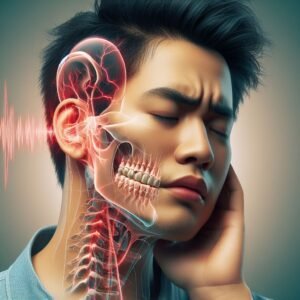Discover how TMD can directly impact your hearing.
You’ll learn about the common symptoms of TMD-related hearing problems, the link between TMD and ear pain, and how TMD can cause tinnitus and dizziness.
If you’re experiencing hearing issues, understanding the connection between TMD and your ears is crucial.
Take the first step towards finding relief by exploring the treatment options available for TMD-related hearing problems.
Key Takeaways
- TMD can lead to disturbances in auditory function, causing symptoms such as tinnitus or hearing loss.
- TMD-related hearing problems require proper diagnosis and treatment.
- Common symptoms of TMD-related hearing problems include ear pain or discomfort, a feeling of fullness or pressure in the ears, tinnitus, and decreased ability to hear certain sounds or frequencies.
- TMD can cause tinnitus and dizziness by affecting the muscles, ligaments, and nerves around the temporomandibular joint (TMJ).

Understanding TMD and Its Impact on Hearing
To understand how TMD can impact your hearing, let’s delve into the connection between temporomandibular joint disorder and auditory function.
The temporomandibular joint (TMJ) is located in front of each ear and connects the jawbone to the skull. When this joint is affected by TMD, it can cause a variety of symptoms, including pain, stiffness, and limited movement in the jaw.
But did you know that TMD can also affect your hearing? The close proximity of the TMJ to the ear canal and the structures responsible for hearing can lead to disturbances in auditory function. These disturbances can manifest as tinnitus, a ringing or buzzing sound in the ears, or even hearing loss.
Now, let’s explore the common symptoms of TMD-related hearing problems.
Common Symptoms of TMD-related Hearing Problems
If you experience TMD-related hearing problems, you may notice several common symptoms. One of the most common symptoms is ear pain or discomfort. This can range from a mild ache to sharp, shooting pain in one or both ears.
Another symptom is a feeling of fullness or pressure in the ears, similar to the sensation you might experience during a flight or when you have a cold.
Additionally, some people with TMD-related hearing problems may experience tinnitus, which is a ringing, buzzing, or hissing sound in the ears. Others may notice a decrease in their ability to hear certain sounds or frequencies.
If you’re experiencing any of these symptoms, it’s important to consult with a healthcare professional for a proper diagnosis and treatment.
The Link Between TMD and Ear Pain
Experiencing ear pain with TMD? Let’s explore the link between TMD and ear pain.
When you have temporomandibular joint disorder (TMD), the joint that connects your jaw to your skull becomes inflamed and can cause various symptoms, including ear pain.
The close proximity of the temporomandibular joint (TMJ) to the ear can lead to referred pain, meaning that the pain from TMD can be felt in the ear.
The TMJ and the ear share common nerve pathways, which can result in discomfort and aching in the ear when the TMJ is affected.
This ear pain can range from mild to severe and may be accompanied by other TMD symptoms such as jaw pain, headaches, and difficulty in opening or closing the mouth.
Understanding this link between TMD and ear pain is crucial for proper diagnosis and treatment.
Now, let’s delve into how TMD can cause tinnitus and dizziness.
How TMD Can Cause Tinnitus and Dizziness
When TMD affects your temporomandibular joint (TMJ), it can lead to tinnitus and dizziness.
Tinnitus is a condition characterized by ringing or buzzing sounds in the ears, which can be constant or intermittent. TMD can cause tinnitus by affecting the muscles and ligaments around the TMJ, leading to inflammation and compression of the auditory nerves. This compression can disrupt the normal functioning of the nerves and result in the perception of sound that isn’t actually present.
Additionally, TMD can cause dizziness or vertigo, which is a sensation of spinning or loss of balance. This occurs when the TMJ dysfunction affects the vestibular system, which is responsible for maintaining our sense of balance. The imbalance created by TMD can trigger dizziness and a feeling of unsteadiness.
Seeking Treatment for TMD-related Hearing Issues
To address TMD-related hearing issues, consult with a healthcare professional specializing in temporomandibular joint disorders. They can provide a comprehensive evaluation of your condition and recommend appropriate treatment options.
Here are some steps you can take to seek treatment for TMD-related hearing issues:
- Schedule an appointment with an experienced dentist or an otolaryngologist.
- Discuss your symptoms, medical history, and any previous treatments you have tried.
- Undergo a physical examination, including a thorough examination of your jaw and surrounding structures.
- Consider diagnostic tests such as imaging studies or audiological evaluations to assess the extent of the hearing issues.
- Work with your healthcare professional to develop a personalized treatment plan, which may include conservative measures, such as pain management techniques, dental splints, or physical therapy.
Conclusion
In conclusion, if you’re experiencing hearing problems such as ear pain, tinnitus, or dizziness, it could be a result of temporomandibular joint disorder (TMD).
TMD can affect your hearing by causing inflammation and dysfunction in the jaw joint, which can then impact the delicate structures of the ear.
Seeking treatment for TMD-related hearing issues is crucial in order to alleviate symptoms and improve overall quality of life.

Mr. Mark Rogers is independent health investigator with over 25+ years of experience. He’s also a father and past TMJ sufferer. He’s explored numerous treatment options and found the most lasting relief from Neuromuscular Release Therapy. His passions include biohacking, cycling, and spending time with his family. He’s based out of beautiful Atlanta, Georgia. You can find him on his social profiles below.